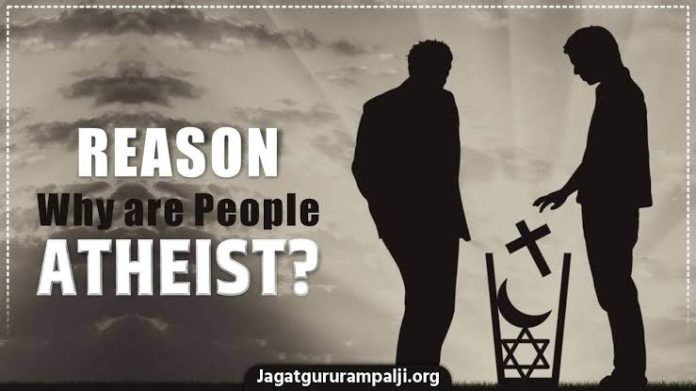KANO, Nigeria — When the megaphone called out for the daily Islamic prayers, the nonbeliever grabbed his prayer beads and ambled through the streets to join others at the mosque in Kano, northern Nigeria’s largest city. Formerly a Muslim, he now identifies as an atheist but remains closeted, performing religious obligations only as a cover.
“To survive as an atheist, you cannot act like one,” said the man, who spoke to The Associated Press on condition of anonymity over fears for his safety. He said he narrowly escaped being killed by a mob in 2015 after some people found out he had forsaken Islam.
“If I ever come out in northern Nigeria to say I am an atheist, it will be an automatic death sentence,” said the man, a business owner in his 30s.
In parts of the world, the religiously unaffiliated are on the rise, and can safely and publicly be a “none” — someone who identifies as an atheist, agnostic or nothing in particular. In countries like Nigeria, the situation is starkly different.
Nonbelievers in Nigeria said they perennially have been treated as second-class citizens in the deeply religious country whose 210 million population is almost evenly divided between Christians dominant in the south and Muslims who are the majority in the north. While the south is relatively safe for nonbelievers, some say threats and attacks have worsened in the north since the leader of the Humanist Association of Nigeria, Mubarak Bala, was arrested and later jailed for blasphemy.
The Associated Press spoke to seven nonbelievers to document their experiences. Most spoke anonymously and in secret locations over concerns for their safety.
“Bala’s imprisonment rolled our movement underground,” Leo Igwe, a founder of the humanist association, said of the group’s leader, who in 2022 was jailed for 24 years. A court convicted him on an 18-count charge of blaspheming Islam and breach of public peace through his posts on Facebook.
Since Bala was prosecuted by the Kano state government, the humanist association — which has several hundred members — has gone underground, struggling with threats to members who no longer hold meetings, Leo said.
Nigeria’s constitution provides for freedom of religion and expression, but activists say threats to religious freedom are common, especially in the north.
Almost half of the countries in Africa, including Nigeria, have statutes outlawing blasphemy. In most secular courts in Nigeria, the stiffest penalty for a blasphemy charge is two years in prison, while it carries a death penalty in the Islamic courts active in the north.
There are no records of any such executions in recent years. The most recent instance of a death sentence, issued in December against an Islamic cleric, has not been carried out.
The Shariah law operating in Islamic courts defines blasphemous acts as those committed by anyone who “intentionally abuses, insults, derogates, humiliates or seeks to incite contempt of the holy Prophet Muhammad.”
But what exactly constitutes an insult to Islam is often open to interpretation by accusers; some alleged offenders have been attacked and killed before any trial.
At least three people have been killed for alleged blasphemy in northern Nigeria in the past year. The latest victim was a Muslim stoned to death in June after being accused of blaspheming Islam during an argument at a market. Those who stoned him included children, according to a video reviewed by the AP.
Authorities in Nigeria have failed to act to prevent such attacks, and prosecutions have been rare, said Isa Sanusi, director of Amnesty International in Nigeria.
“The alarming uptick in blasphemy killings and accusations underscores the urgency with which the authorities must wake up to Nigeria’s international legal obligations to respect and protect human rights, including freedom of religion,” Sanusi said.
Perpetrators of such attacks are ignorant of Islamic teachings, which discourage violence and do not compel anyone to become an adherent unwillingly, said Professor Usman Dutsinma, deputy director of the Center for Islamic Civilization and Interfaith Dialogue at Kano’s Bayero University.
“The best thing you can do is to subject him to reasoning,” Dutsinma said of nonbelievers. “But if somebody denounces Islam … some punitive measures must be taken against him. That is what Islam provides.”
Threats against the nonreligious in Nigeria are common on social media. On a Facebook group named Anti-Atheist, users frequently posted messages that trolled or threatened atheists, using the Hausa language of northern Nigeria.
The atheist in Kano, in a dimly lit room, spoke with a mix of grit and fear about his experiences as a nonbeliever in a nation where about 98% of the population are Christians or Muslims, according to the Pew Research Center. A Facebook post from Bala in 2015, critiquing some Islamic teachings, influenced the man’s shift to atheism.
The man said he created a Facebook account of his own with a fake profile, regularly posting comments that questioned religion.
“My biggest fear is for people I live with to know that I am an atheist,” he said.
–AP
Share your story or advertise with us: Whatsapp: +2347068606071 Email: info@newspotng.com















